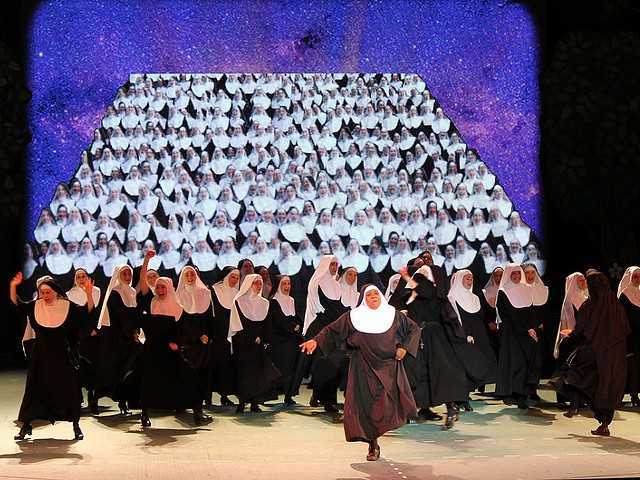Although just about everyone was happy with the Muny's opening production of Monty Python's Spamalot (as indeed they should have been), apparently some attendees were not so pleased with the amended lyrics to the hilarious Act Two song, "You Won't Succeed on Broadway If You Don't Have Any Jews." At the Muny, Sir Robin (the ever-delightful John Scherer) sang, "...if you don't have any stars," a toothless replacement for the original version.
Now that we live in a world of social media, it's easy — perhaps too easy — for naysayers to vent their dismay. Some disenchanted Munygoers did, to the extent that executive producer Mike Isaacson took to the Muny Facebook page to explain that the song's original lyric was rewritten for the London production. Apparently the Brits don't much care whether or not people succeed on Broadway (except when they export West End plays and musicals to the Big Apple). In London the retitled "Star Song" lamely chanted, "You won't succeed in showbiz if you don't have any stars." The officially licensed version is now a hybrid: We're back to Broadway, but the Jews are out.
I was among those who thought that the revised song was inferior to the original. My Spamalot review charged the Muny with "timidity," a noun that harkens images of Muny personnel poring over their computers rewriting the lyrics. Apparently I had forgotten that last summer, while researching a story about the new Muny administration ["Muny Magic," July 5, 2012], I was in Isaacson's office when he spoke by telephone with Thoroughly Modern Millie lyricist Richard Scanlan. Isaacson secured Scanlan's approval for a tiny, insignificant Millie lyric change.
Thanks to YouTube, the minutest unapproved alterations are made at your peril. No way could the Muny rewrite an entire song without approval.
Isaacson's Facebook essay references other changes in this summer's productions. He informs us, for instance, that Princess Fiona's early introduction in Shrek the Musical (not a good idea) was added in London — yet another example of a musical getting mucked over while trying to satisfy those pesky Brits. According to Isaacson, the Muny Shrek included "elements from Broadway, the tour (two songs), London (a revised opening) and even a song that was cut in the pre-Broadway tryout." Now we know why this flawed but quirky musical has come to resemble a patchwork quilt.
But the Spamalot dustup confirms a telling truth about St. Louis' affinity for musical theater. Years ago, long before he was associated with the Muny, Isaacson was talking with New York music executive Bill Rosenfield, who has produced more than 50 original-cast CDs. Why, Rosenfield asked, were CD sales of Broadway musicals so much higher in St. Louis than in any other city outside of New York? That's easy to explain, Isaacson replied: "The Muny."
Exactly.
The 95-year-old Muny has served as the great common denominator for five generations of St. Louis theatergoers. Nearly a century of exposure to operettas, then book musicals, now mega-musicals has cultivated a discerning audience. Our enthusiasm for musicals is high; so too are our standards.
Five years ago this week, in writing about the acclaimed Lincoln Center staging of South Pacific, New York Times columnist Frank Rich, who from 1980 to 1993 was the most influential theater critic in the nation, revealed that until that current Lincoln Center production, he had never seen this classic 1949 Rodgers & Hammerstein musical. Rich was too young to have attended the original version, and not until 2008 did South Pacific receive a Broadway revival.
Since 1955 South Pacific has been staged nine times in Forest Park. Next week will be the tenth. Always with different casts and slightly different approaches. But always outdoors, which is the optimum way to view a musical that is so much set in the open air and under the night sky. Too bad Frank Rich didn't grow up in St. Louis. His musical-theater education would not have been so deprived.
As for the rest of us, thanks to the Muny we know a good song when we hear one. And when we don't.






